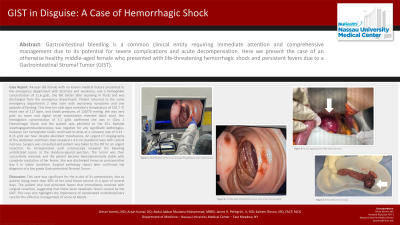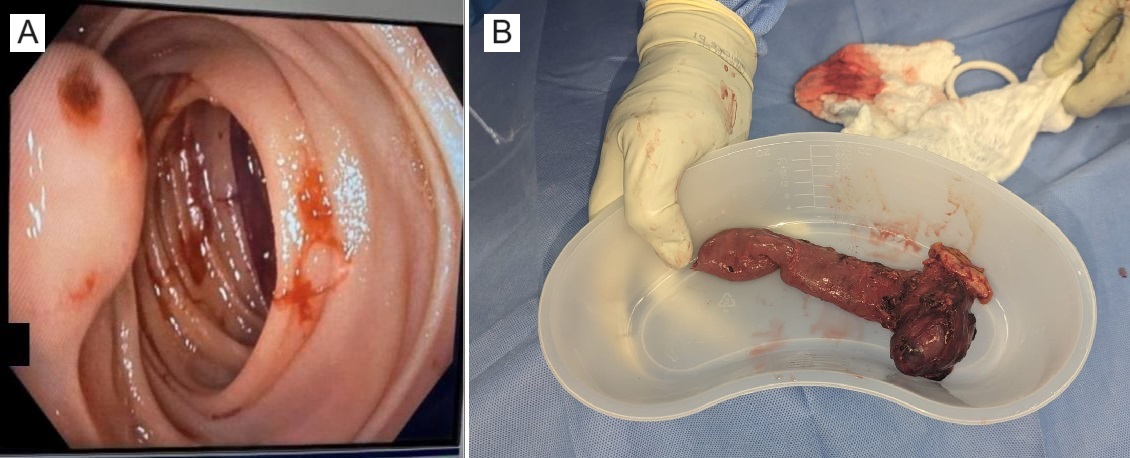Tuesday Poster Session
Category: GI Bleeding
P4214 - GIST in Disguise: A Case of Hemorrhagic Shock
Tuesday, October 29, 2024
10:30 AM - 4:00 PM ET
Location: Exhibit Hall E

Has Audio
- OY
Orhan Yanmis, MD
Nassau University Medical Center
East Meadow, NY
Presenting Author(s)
Orhan Yanmis, MD1, Arjun Kumar, DO1, Abdul Jabbar Maulana Mohammad, MBBS1, James R. Pellegrini, MD2, Kaleem Rizvon, MD, FACG1
1Nassau University Medical Center, East Meadow, NY; 2Nassau University Medical Center, Great River, NY
Introduction: Gastrointestinal bleeding is a common clinical entity requiring immediate attention and comprehensive management due to its potential for severe complications and acute decompensation. Here we present the case of an otherwise healthy middle-aged female who presented with life-threatening hemorrhagic shock and persistent fevers due to a Gastrointestinal Stromal Tumor (GIST).
Case Description/Methods: A 44-year-old female with no known medical history presented to the emergency department with dizziness and weakness, and a hemoglobin concentration of 11.6 g/dL. She felt better after receiving IV fluids and was discharged from the emergency department. Patient returned to the same emergency department 2 days later with worsening symptoms and one episode of fainting. This time her vital signs revealed a temperature of 101.7 °F, heart rate of 117 bpm, and blood pressures of 120/70 mmHg; she was very pale on exam and digital rectal examination revealed black stool. Her hemoglobin concentration of 5.1 g/dL confirmed she was in Class 2 Hemorrhagic Shock and the patient was admitted to the ICU. Bedside esophagogastroduodenoscopy was negative for any significant pathologies, however her hemoglobin levels continued to drop at a constant rate of 0.13 - 0.15 g/dL per hour despite abundant transfusions. An urgent CT Angiography of the Abdomen and Pelvis then revealed a 4.6 cm duodenal mass with central necrosis. Surgery was consulted and patient was taken to the OR for an urgent resection. An intraoperative push enteroscopy revealed the bleeding umbilicated lesion at the duodeno-jejunal junction. The tumor was then successfully resected, and the patient became hemodynamically stable with complete resolution of her fevers. She was discharged home on postoperative day 5 in stable condition. Surgical pathology report later confirmed the diagnosis of a low grade Gastrointestinal Stromal Tumor.
Discussion: This case was significant for the acuity of its presentation, due to patient losing more than 50% of her total blood volume in a span of several days. The patient also had persistent fevers that immediately resolved with surgical resection, suggesting that these were neoplastic fevers caused by the GIST. This case also highlights the importance of coordinated multidisciplinary care for the effective management of acute GI bleeds.

Disclosures:
Orhan Yanmis, MD1, Arjun Kumar, DO1, Abdul Jabbar Maulana Mohammad, MBBS1, James R. Pellegrini, MD2, Kaleem Rizvon, MD, FACG1. P4214 - GIST in Disguise: A Case of Hemorrhagic Shock, ACG 2024 Annual Scientific Meeting Abstracts. Philadelphia, PA: American College of Gastroenterology.
1Nassau University Medical Center, East Meadow, NY; 2Nassau University Medical Center, Great River, NY
Introduction: Gastrointestinal bleeding is a common clinical entity requiring immediate attention and comprehensive management due to its potential for severe complications and acute decompensation. Here we present the case of an otherwise healthy middle-aged female who presented with life-threatening hemorrhagic shock and persistent fevers due to a Gastrointestinal Stromal Tumor (GIST).
Case Description/Methods: A 44-year-old female with no known medical history presented to the emergency department with dizziness and weakness, and a hemoglobin concentration of 11.6 g/dL. She felt better after receiving IV fluids and was discharged from the emergency department. Patient returned to the same emergency department 2 days later with worsening symptoms and one episode of fainting. This time her vital signs revealed a temperature of 101.7 °F, heart rate of 117 bpm, and blood pressures of 120/70 mmHg; she was very pale on exam and digital rectal examination revealed black stool. Her hemoglobin concentration of 5.1 g/dL confirmed she was in Class 2 Hemorrhagic Shock and the patient was admitted to the ICU. Bedside esophagogastroduodenoscopy was negative for any significant pathologies, however her hemoglobin levels continued to drop at a constant rate of 0.13 - 0.15 g/dL per hour despite abundant transfusions. An urgent CT Angiography of the Abdomen and Pelvis then revealed a 4.6 cm duodenal mass with central necrosis. Surgery was consulted and patient was taken to the OR for an urgent resection. An intraoperative push enteroscopy revealed the bleeding umbilicated lesion at the duodeno-jejunal junction. The tumor was then successfully resected, and the patient became hemodynamically stable with complete resolution of her fevers. She was discharged home on postoperative day 5 in stable condition. Surgical pathology report later confirmed the diagnosis of a low grade Gastrointestinal Stromal Tumor.
Discussion: This case was significant for the acuity of its presentation, due to patient losing more than 50% of her total blood volume in a span of several days. The patient also had persistent fevers that immediately resolved with surgical resection, suggesting that these were neoplastic fevers caused by the GIST. This case also highlights the importance of coordinated multidisciplinary care for the effective management of acute GI bleeds.

Figure: Figure A: Umbilicated subepithelial lesion with active extravasation. Figure B: Resected specimen.
Disclosures:
Orhan Yanmis indicated no relevant financial relationships.
Arjun Kumar indicated no relevant financial relationships.
Abdul Jabbar Maulana Mohammad indicated no relevant financial relationships.
James Pellegrini indicated no relevant financial relationships.
Kaleem Rizvon indicated no relevant financial relationships.
Orhan Yanmis, MD1, Arjun Kumar, DO1, Abdul Jabbar Maulana Mohammad, MBBS1, James R. Pellegrini, MD2, Kaleem Rizvon, MD, FACG1. P4214 - GIST in Disguise: A Case of Hemorrhagic Shock, ACG 2024 Annual Scientific Meeting Abstracts. Philadelphia, PA: American College of Gastroenterology.
